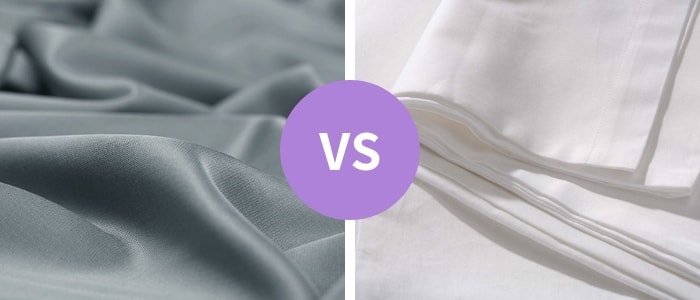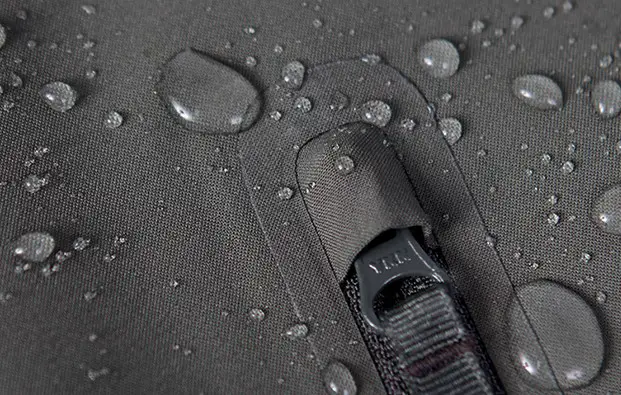Polyester and cotton- one a recent man-made fabric and the other a natural one that has been in usage for ages, are two of the most popular fabrics that compete for the first place at stores and in wardrobes.
If you are out winter shopping, you must be wondering which one is the perfect fit for your needs, polyester or cotton? “Which one is warmer? Why is it warmer?” and a whole array of related questions might just jam your head.
Polyester is much warmer than cotton and that is why polyester is widely used in the manufacturing of winter garments and accessories. With its tightly woven fabric structure and non-breathable feature, polyester can hold a lot of heat to keep you warm during winters.

Polyester fabric can be seen in jackets, sweaters, hoodies and other winter wardrobe essentials and is indeed an unavoidable part of any winter wear collection.
Why is polyester warmer than cotton?
Polyester is better suited for winters than cotton because of the following reasons
1.) Tightly woven fabric
The tighter a fabric is woven, the less breathable the material will be and the better insulating property it will have.
Since polyester is a tightly woven fabric it does not give space for any ventilation that ensures that the heat produced by the body is not lost to the surroundings. The warmth of the body is thus retained and therefore polyester is a perfect fit for winter.
Cotton on the other hand is very breathable and loosely woven that it cannot retain the heat to keep the body warm during winters.
2.) Polyester do not absorb sweat, whereas cotton does
Polyester is waterproof in nature and dries up quick, so it does not absorb any sweat or moisture.
Therefore, no matter how sweaty you get while working in winters the polyester cloth won’t get damp and give your chills. The sweat will evaporate quickly leaving you warm and comfortable.
Cotton on the other hand absorbs the sweat and the sweat won’t evaporate that fast, thereby cooling the body and reducing the body heat.
Therefore cotton is not a great choice if you wish to work for long hours out in the cold.
3.) Waterproof

Polyester is a waterproof fabric and won’t get damp when there is snowfall or frosty winds.
4.) Windbreaker
Tightly woven polyester can keep the frosty wind out and keep you warm.
See also: Is Polyester Good for Rain?
How to wear polyester and cotton in winters to keep warm?
Usually polyester of different types are woven together while manufacturing winter clothes and accessories. Polyester can be woven into very thin fabric as well as thick materials like Kevlar.
Even though cotton is not as insulating as polyester due to the comfort level and breathability of the material, cotton can also be inculcated into your basic winter attires.
Polyester is the most preferred material for inner and outer layers of winter clothing as it can wick away sweat and keep away wind and moisture respectively.
Cotton is more preferable as a middle layer as it is a breathable fabric and can actually aid the evaporation of sweat from the inner layer.
Pros and cons of Polyester
Pros:
1.) Warmth
The fabric is tightly woven, preventing any form of ventilation thereby making them warmer and more suitable for winters.
2.) Durability
Polyester is a synthetic fabric that can withstand thinning or related types of degradation, hence it is one of the most durable materials available in the market.
3.) Water resistant
Polyester is a water resistant material and do not absorb sweat or moisture. This waterproof nature is a boon when it comes to drying the clothes post washing, during winters.
4.) Washing/maintenance
Polyester do not shrink or wrinkle when washed. Therefore you do not have to spend hours picking out the perfect detergent or using the right temperature of water to wash polyester clothes and you do not have to iron them every time they come out of laundry.
Polyester clothes are simpler to use and maintain when compared to cotton.
5.) Cost
Polyester is one of the most cheapest fabrics available and the most versatile, comfortable and stylish designs would come at a very affordable price.
6.) Colours
The most aesthetically appealing feature of polyester fabric is that they are available in a wide variety of colours.
Polyester fabrics can take u every hue imaginable and polyester fabrics are very good at retaining the colour as well.
Cons:
1.) Not breathable
Even though the lack of breathability adds to the insulating property of polyester, they can be a bit uncomfortable when worn for long hours.
2.) Can cause allergies
Since polyester is a synthetic and non-breathable material, it can cause allergies in people with hypersensitive skin or skin conditions.
3.) Rough feel
The material has a rough feel as it is a synthetic fabric but they can be woven into softer fabrics as well.
Pros and cons of cotton
Pros:
1.) Breathable
Cotton is usually woven loosely and being a natural fiber, cotton allows free flow of air. It is well suited for summers and would keep you cool and fresh.
2.) Moisture absorption
Cotton can absorb moisture very well and therefore is a good option when there is a lot of sweating involved.
3.) Prevents sweating
The breathable nature of the fabric and the basic nature of the material that provides coolness to the body and prevents sweating.
4.) Feels good
Since cotton is a natural fabric, it is very soft and feels really good when worn.
5.) Prevents allergies
The material is made of natural materials and therefore do not cause any skin abrasions or allergies.
Cons:
1.) Hard to maintain
Cotton shrinks down or gets all wrinkly after washing and therefore great care has to be taken while washing cotton clothes.
2.) Not warm enough
Cotton is breathable and therefore not warm enough for winters.
3.) Not durable
Cotton would not last as long as synthetic materials like polyester.
4.) Colour can fade easily
Cotton can be dyed in different colours but they are not that good at retaining the hue. The colour tends to fade off with time.
See also: Are Cotton Shirts Better Than Polyester?
Difference between polyester and cotton
| Properties | Polyester | Cotton |
| Nature of material | Synthetic | Natural |
| Structure of fabric | Tightly woven | Loosely woven(can be tight too) |
| Warmth | Warmer | Not warm enough |
| Breathability | Not breathable | Breathable |
| Cost | Cheaper | Affordable |
| Durability | Durable | Not durable |
| Suitable for winters | Yes | Yes if layered and tightly woven |
| Suitable for summers | No | Yes |
| Retention of colour | Retains colour | Colour fades over time |
| Suitable for hypersensitive skin | No | Yes |
| Absorbs sweat | No | Yes |
| Maintenance | Easy | Hard |
How to identify polyester and cotton?
Polyester usually has a rough and coarse texture. It is not usually soft but can at times be woven into a smooth silk like texture. Also when the material is squeezed up in your palm it will not leave any wrinkles.
Cotton on the other hand feels so soft on touching and can have wrinkles. If a strand of fabric is available, the burn test can be conducted to find if it is cotton or polyester.
If the fabric curls up when brought next to the flame, it is polyester and if it burns without curling up it is cotton.







